 W
WSir Robert Kerr, 1st Earl of Ancram, was a Scottish nobleman, English politician and writer.
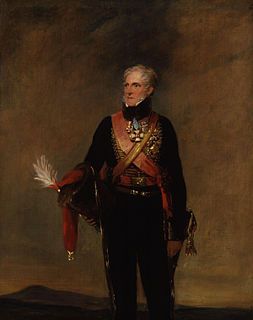 W
WHenry William Paget, 1st Marquess of Anglesey,, styled Lord Paget between 1784 and 1812 and known as the Earl of Uxbridge between 1812 and 1815, was a British Army officer and politician. After serving as a Member of Parliament for Carnarvon and then for Milborne Port, he took part in the Flanders Campaign and then commanded the cavalry for Sir John Moore's army in Spain during the Peninsular War; his cavalry showed distinct superiority over their French counterparts at the Battle of Sahagún and at the Battle of Benavente, where he defeated the elite chasseurs of the French Imperial Guard. During the Hundred Days he led the charge of the heavy cavalry against Comte d'Erlon's column at the Battle of Waterloo. At the end of the battle he lost part of one leg to a cannonball. In later life he served twice as Master-General of the Ordnance and twice as Lord Lieutenant of Ireland.
 W
WBenedict Arnold was an American military officer who served during the Revolutionary War. He fought with distinction for the American Continental Army, rising to the rank of major general, before defecting to the British side of the conflict in 1780. General George Washington had given him his fullest trust and placed him in command of West Point, New York. Arnold planned to surrender the fort to British forces, but the plot was discovered in September 1780 and he fled to the British lines. Arnold received a commission as a brigadier general in the British Army, commanding the American Legion in the later part of the conflict. Arnold's name quickly became a byword in the United States for treason and betrayal because he led the British army in battle against the very men whom he had once commanded.
 W
WAlexander Lindsay, 6th Earl of Balcarres and de jure 23rd Earl of Crawford was the son of James Lindsay, 5th Earl of Balcarres. He was a general in the British Army.
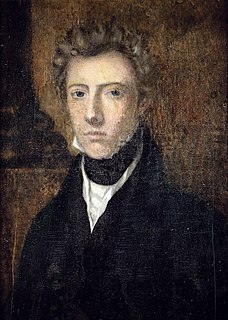 W
WJames Miranda Steuart Barry was a military surgeon in the British Army, born in Cork, Ireland. Barry obtained a medical degree from the University of Edinburgh Medical School, then served first in Cape Town, South Africa, and subsequently in many parts of the British Empire. Before retirement, Barry had risen to the rank of Inspector General in charge of military hospitals, the second highest medical office in the British Army. Barry not only improved conditions for wounded soldiers, but also the conditions of the native inhabitants, and performed the first recorded caesarean section by a European in Africa in which both the mother and child survived the operation.
 W
WWilliam Pulteney, 1st Earl of Bath, was a British Whig politician who sat in the House of Commons from 1707 to 1742, when he was created the first Earl of Bath by King George II.
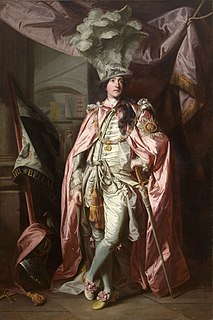 W
WCharles Coote, 1st Earl of Bellomont KB PC(I) was an Irish peer. He held the political position as one of joint Postmasters General of Ireland.
 W
WWilliam Bland was a transported convict, medical practitioner and surgeon, politician, farmer and inventor in colonial New South Wales, Australia.
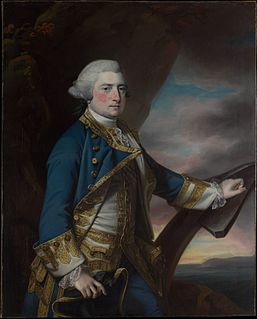 W
WAdmiral Harry Powlett, 6th Duke of Bolton PC was a British nobleman and naval officer.
 W
WSir Alexander Boswell, 1st Baronet, was a Scottish poet, antiquary, and songwriter. The son of Samuel Johnson's friend and biographer James Boswell of Auchinleck, he used the funds from his inheritance to pay for a seat in Parliament and then successfully sought a baronetcy for his political support of the government. However, his finances subsequently collapsed and after being revealed as the author of violent attacks on a rival, he died as a result of wounds received in a duel.
 W
WMajor General Edward Braddock was a British officer and commander-in-chief for the Thirteen Colonies during the start of the French and Indian War (1754–1763), the North American front of what is known in Europe and Canada as the Seven Years' War (1756–1763).
 W
WSir Francis Burdett, 5th Baronet was an English reformist politician, the son of Francis Burdett and his wife Eleanor, daughter of William Jones of Ramsbury Manor, Wiltshire, and grandson of Sir Robert Burdett, Bart. From 1820 until his death he lived at 25 St James's Place, London.
 W
WGeorge Canning was a British Tory statesman. He held various senior cabinet positions under numerous prime ministers, including two important terms as Foreign Secretary, finally becoming Prime Minister of the United Kingdom for the last 118 days of his life, from April to August 1827.
 W
WLieutenant-General James Thomas Brudenell, 7th Earl of Cardigan,, styled as Lord Cardigan, was an officer in the British Army who commanded the Light Brigade during the Crimean War. He led the Charge of the Light Brigade at the Battle of Balaclava.
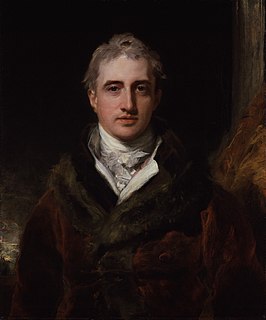 W
WRobert Stewart, 2nd Marquess of Londonderry,, usually known as Lord Castlereagh, derived from the courtesy title Viscount Castlereagh by which he was styled from 1796 to 1821, was an Anglo-Irish statesman. As British Foreign Secretary, from 1812 until his suicide in 1822 he was central to the management of the coalition that defeated Napoleon, and he was the principal British diplomat at the Congress of Vienna.
 W
WThomas Cochrane, 10th Earl of Dundonald, Marquess of Maranhão, styled Lord Cochrane between 1778 and 1831, was a British naval flag officer of the Royal Navy, mercenary and Radical politician. He was a successful captain of the Napoleonic Wars, leading Napoleon to nickname him Le Loup des Mers, 'The Sea Wolf'. He was successful in virtually all of his naval actions.
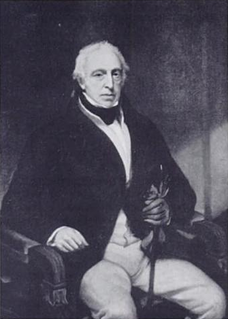 W
WHugh Elliot was a British diplomat and then a colonial governor.
 W
WMajor General Roger Elliott was one of the earliest British Governors of Gibraltar. A member of the Eliot family, his son Granville Elliott became the first Count Elliott and his nephew George Augustus Eliott also became a noted Governor and defender of Gibraltar.
 W
WCharles James Fox, styled The Honourable from 1762, was a prominent British Whig statesman whose parliamentary career spanned 38 years of the late 18th and early 19th centuries. He was the arch-rival of the Tory politician William Pitt the Younger; his father Henry Fox, 1st Baron Holland, a leading Whig of his day, had similarly been the great rival of Pitt's famous father, William Pitt, 1st Earl of Chatham.
 W
WMajor-General Sir Hugh Robert Rollo Gillespie was an officer in the British Army. The Army's historian Sir John Fortescue called him "The bravest man ever to wear a red coat".
 W
WRees Howell Gronow, "Captain Gronow", was a Welsh Grenadier Guards officer, an unsuccessful parliamentarian, a dandy and a writer of celebrated reminiscences.
 W
WGeorge Johnstone was an officer of the Royal Navy who saw service during the War of the Austrian Succession, the Seven Years' War and the American War of Independence, rising to the rank of post-captain and serving for a time as commodore of a squadron. In a multifaceted career he was also a member of Parliament, a director of the East India Company, a member of the Carlisle Peace Commission and the first Governor of West Florida from 1763 until 1767.
 W
WJames Maitland, 8th Earl of Lauderdale was Keeper of the Great Seal of Scotland and a representative peer for Scotland in the House of Lords.
 W
WJohn Law was a Scottish economist who distinguished money, a means of exchange, from national wealth dependent on trade. He served as Controller General of Finances under the Duke of Orleans, who was regent for the juvenile Louis XV of France. In 1716, Law set up a private Banque Générale in France. A year later it was nationalised at his request and renamed as Banque Royale. The private bank had been funded mainly by John Law and Louis XV; three-quarters of its capital consisted of government bills and government-accepted notes, effectively making it the nation's first central bank. Backed only partially by silver, it was a fractional reserve bank. Law also set up and directed the Mississippi Company, funded by the Banque Royale. Its chaotic collapse has been compared to the 17th-century tulip mania in Holland. The Mississippi bubble coincided with the South Sea bubble in England, which allegedly took ideas from it. Law as a gambler would win card games by mentally calculating odds. He originated ideas such as the scarcity theory of value and the real bills doctrine. He held that money creation stimulated an economy, paper money was preferable to metal, and dividend-paying shares a superior form of money. The term "millionaire" was coined for beneficiaries of Law's scheme.
 W
WSamuel Martin was a British politician and administrator, and in Antigua a slave plantation owner.
 W
WJames Paull (1770–1808) was a British politician and duellist.
 W
WSir Robert Peel, 2nd Baronet, was a British Conservative statesman who served twice as Prime Minister of the United Kingdom and twice as Home Secretary. He is regarded as the father of modern English policing, owing to his founding of the Metropolitan Police Service. Peel was one of the founders of the modern Conservative Party.
 W
WWilliam Pitt the Younger was a prominent British Tory statesman of the late eighteenth and early nineteenth centuries. He became the youngest prime minister of Great Britain in 1783 at the age of 24 and the first prime minister of the United Kingdom of Great Britain and Ireland as of January 1801. He left office in March 1801, but served as prime minister again from 1804 until his death in 1806. He was also Chancellor of the Exchequer for all of his time as prime minister. He is known as "the Younger" to distinguish him from his father, William Pitt, 1st Earl of Chatham, who is customarily referred to as "William Pitt the Elder" and had previously served as prime minister.
 W
WCharles Lennox, 4th Duke of Richmond, 4th Duke of Lennox, 4th Duke of Aubigny, was a Scottish peer, soldier, politician, and Governor General of British North America.
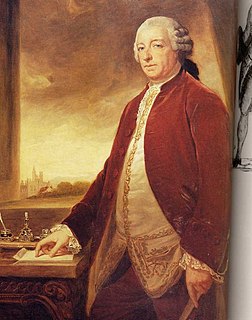 W
WGeorge Germain, 1st Viscount Sackville, PC, styled The Honourable George Sackville until 1720, Lord George Sackville from 1720 to 1770 and Lord George Germain from 1770 to 1782, was a British soldier and politician who was Secretary of State for America in Lord North's cabinet during the American War of Independence.
 W
WJames Stuart of Dunearn WS was a Scottish politician. He was the target of several personal attacks by opponents and participated in a duel that fatally wounded Sir Alexander Boswell.
 W
WMajor-General James Stuart was a British Army officer who served in various conflicts in India during the 18th century. His service in the East India Company was marked by his conflict with Lord Pigot, the governor of Madras; Stuart's arrest of the latter in 1776 resulted in his suspension as commander-in-chief, and he was not vindicated until 1780. He later fought in the Second Anglo-Mysore War, but was suspended from command in 1782 by Lord Macartney, an action that provoked a duel between the two men. Stuart was a younger brother of the lawyer and politician Andrew Stuart.
 W
WGeorge Tierney PC was an Irish Whig politician. For much of his career he was in opposition to the governments of William Pitt and Lord Liverpool. From 1818 to 1821 he was Leader of the Opposition in the House of Commons.
 W
WArthur Wellesley, 1st Duke of Wellington, was an Anglo-Irish soldier and Tory statesman who was one of the leading military and political figures of 19th-century Britain, serving twice as prime minister. He is one of the commanders who won and ended the Napoleonic Wars when the coalition defeated Napoleon at the Battle of Waterloo in 1815.
 W
WJohn Wilkes was a British radical journalist and politician, as well as a magistrate, essayist and soldier. He was first elected a Member of Parliament in 1757. In the Middlesex election dispute, he fought for the right of his voters—rather than the House of Commons—to determine their representatives. In 1768, angry protests of his supporters were suppressed in the St George's Fields Massacre. In 1771, he was instrumental in obliging the government to concede the right of printers to publish verbatim accounts of parliamentary debates. In 1776, he introduced the first bill for parliamentary reform in the British Parliament.
 W
WGeorge William Finch-Hatton, 10th Earl of Winchilsea, 5th Earl of Nottingham was an English politician known for duelling with the then Prime Minister, Arthur Wellesley, 1st Duke of Wellington.